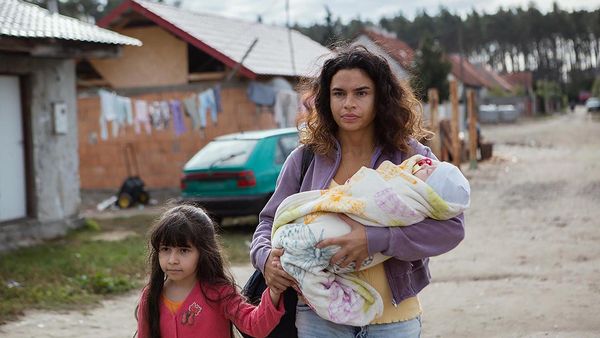Eye For Film >> Movies >> Gipsy Queen (2019) Film Review
Gipsy Queen
Reviewed by: Amber Wilkinson

Alina Serban, who gave a memorable performance as a single mum driven to desperate measures in last year's Alone At My Wedding, puts in an equally humanistic portrayal of single motherhood in Hüseyin Tabak's Gipsy Queen. In addition to being a family tale, this is also a boxing drama, that doesn't stray too far from the Rocky path, but Tabak takes an unusual structural approach that puts character first, meaning we won't step into the ring until quite late in the film.
A prologue sees her character Ali giving birth to her second child before throwing herself on the mercy of her father in a bid to put a roof over her young daughter and baby son's head, only to find herself rejected. It's economical but this, and other flashbacks to the Roma community, where Ali was once a promising young boxer, are the film's weakest element, bringing with them an unwelcome whiff of sentimentality that is largely absent elsewhere. This gives way to a series of pastel drawings over the credits - an idea that will return late in the film - which depict Ali's progress afterwards, as we see the three of them begging before winding up at the present day in Hamburg, about half a decade on.

Her daughter Esmerelda is now 11 and, unbeknownst to Ali, on the wrong end of some bullying at school due to her Roma heritage. Son Mateo is five and the three of them have formed a sort of psuedo family unit with a young German woman named Mary (Irina Kurbanova), who is both flatmate and a babysitter for Ali, while she works all hours and all jobs for rock-bottom pay.
Among the jobs she takes on is glass collecting at a nightclub called Ritze, which hosts boxing fight nights in the basement. It is here that she catches the eye of the owner Tanne (Tobias Moretti), who has swapped his heavyweight career for heavy drinking and soon the course is set for the inevitable bout.
If that part of the story's trajectory has a familiar feel, it is given fresh verve by the social-realist backdrop. There's a palpable sense of the quiet stoicism of Ali and of the loving family unit she has created - with Serban capturing the internal conflict of someone who doesn't know where to put her emotions before she rediscovers the joys of a punchbag. Tabak, meanwhile, shows how precarious these sort of grey economy jobs are - from hoteliers who rip off your wages to builders who flout health and safety rules - while also exploring society's casual racism and disregard for those they regard as the underclass.
Many of the scenes involving the children are filled with joy, with scripting that always feels realistic and a conversation Tanne has with them while he waits for their mum is a comic triumph. Tabak and cinematographer Lukas Gnaiger also handle the camera well once they step into the ring, with the fights Ali takes part in bruising and gripping in equal measure, even if he can't resist a pinch of sentimental gloss. When it comes to portrayals of multifaceted single mums, Serban remains the reigning champ.
Reviewed on: 28 Nov 2019















